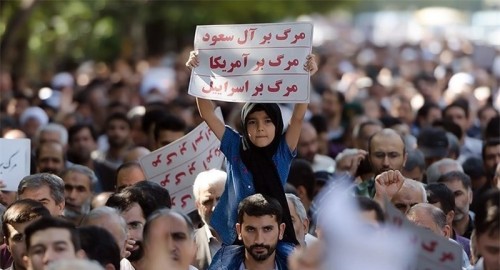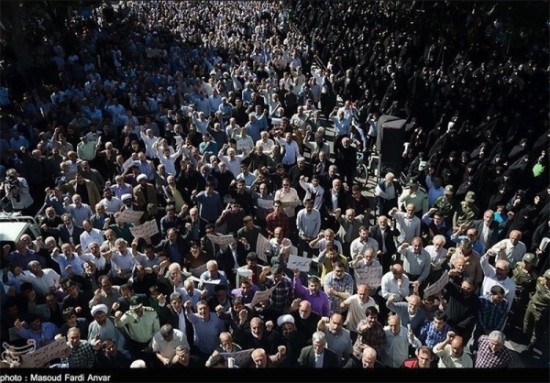PHOTO: A girl holds up a poster criticizing Saudi Arabia during a protest march in Tehran on Friday
LATEST
Mourning the deaths of at least 136 Iranians among 717 killed in Thursday’s stampede in Mecca, Iran’s politicians and clerics have maintained pressure on Saudi Arabia over the incident.
Another 102 Iranians, including a former Ambassador to Lebanon, were injured and 344 are still missing. The tragedy occurred when two groups of pilgrims, preparing for one of the last major rites of the hajj, collided at the intersection of two narrow streets.
The Supreme Leader blamed “misconduct” and “improper acts” and said the Saudi Government had to “accept its heavy accountability”, and more criticism followed on Friday.
The Secretary of the Supreme National Security Council, Ali Shamkhani, chided “Saudi weakness in management” and linked it to Iranian criticism of Riyadh’s foreign policy “using its security and law enforcement forces to invade Yemen and crush the Muslim people of Bahrain”.
Leading Tehran Friday Prayers, Ayatollah Emami Kashani called on the Organization of Islamic Cooperation to take over management of the hajj from the House of Saud:
[The Saudis] say the pilgrims themselves were disorderly and that the weather was hot [but] the world will not accept it. This is a lie.
Everyone knows the whole story, that it was a lack of worthy management of hajj and they closed the paths and brought the situation to this.
Other clerics went even farther. The Mashhad Prayer Leader, Ayatollah Alamolhoda, said that “the shortcomings of the House of Saud regime in managing the hajj are intentional” and that the “Global Arrogance [the West]…made the House of Saud regime dominant on this land [Saudi Arabia] in order to undermine the hajj”. Grand Ayatollah Hossein Nouri Hamedani asked, “Is it not time yet for Islamic governments to make a serious decision about the crimes of the House of Saud?”
Speaker of Parliament Ali Larijani called for a review of the administration of the hajj by Muslim countries and the Organization of Islamic Cooperation: “What all Muslim nations expect is that the Saudi government, according to its responsibilities, act with prudence and commitment and to confront the offenders and give a satisfactory explanation about what happened to the [pilgrims].”
Even former President Hashemi Rafsanjani, a long-time advocate of engagement with Riyadh, was pushed into high-profile denunciation of the Saudi leadership. He used both his website and his Instagram account to pronounce, “The Saudis must answer to the Islamic World for this tragic disaster.”
The Rouhani Government has hoped that it could use engagement with Saudi Arabia not only to improve bilateral relations but to support a resolution of crises in the regime from Yemen to Syria to Bahrain.
Rouhani effectively admitted short-term defeat on Friday after his arrival in New York for the UN General Assembly. After he blamed Saudi “ineptitude” for the stampede, he said, “Of course, relations between Saudi Arabia and Iran have worsened because of Yemen.”
While saying that Iran would not “hesitate” if it saw an opening for diplomacy with the Saudis, he said “we are completely opposed” to the Saudi-led military intervention in Yemen, which began in March to check the Ansar Allah (Houthi) movement.
Thousands of Iranians marched on Friday to condemn the Saudis over the disaster.
Rouhani: US Firms Welcome to Invest in Iran After Lifting of Sanctions
President Rouhani has said that American companies are welcome to invest in Iran and transfer technology to the Islamic Republic after the removal of sanctions.
Meeting managers of American trade, economic, and industrial enterprises in New York on Friday, Rouhani said, “The post-sanctions atmosphere has created new economic and political conditions which big trade, economic and industrial companies should take advantage of.” He asserted that economic cooperation can bridge gaps between Iran and the United States.
The President said Iran’s enormous energy resources, its geopolitical position, and its regional security and stability present a unique opportunity for economic activities.
Rouhani’s tone is in sharp contrast to that of the Supreme Leader, who has repeatedly denounced the US and ruled out any political cooperation despite the July 14 nuclear agreement between Iran and the 5+1 Powers.


